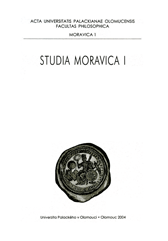VZTAH JOSEFA DOBROVSKÉHO K JAZYKU A PÍSMU JIŽNÍCH SLOVANŮ
JOSEF DOBROVSKÝ AND HIS ATTITUDE TOWARDS THE LANGUAGE AND SCRIPT OF SOUTHERN SLAVES
Author(s): Eva PallasováSubject(s): Language and Literature Studies
Published by: Univerzita Palackého v Olomouci
Summary/Abstract: In considering the history of minor Slavonic nations one important fact cannot be over-looked: each of them had to struggle hard for assertion of their own language, literature, and culture. This paper is intended to present some of the problems concerning the graphical presentation of the phonological systems of the Slavonic languages. Problems with the graphemic system of the language occupied constant position within the context of the so-called “younger literary languages”, i.e., languages without old literary texts. Controversies over the orthography broke out with unprecedented vigour first of all at the Southern Slavonic nations; Josef Dobrovský also played his role in these contentions, against his will, though. The development of the Slovene orthography can be taken as a suitable instance. Primož Trubar was seeking a suitable orthography for his books printed in Slovene; he selected such a way of recording that led to the digraphic orthography (Bogorič’s alphabet, “bogoričica”) eventually. In connection with the beginning of the Slavonic studies two unsuccessful experiments to adapt the Slovene graphemics took place, viz. Dajnko’s and Metelka’s reforms, both on Kopitar’s initiative. The actual orthography of the modern Slovene language is a result of an adaptation of Gaj’s orthographic system, which had been ultimately inspired by the Czech model. So the development proceeded in the direction which had been predicted by Josef Dobrovský in his Etymologikon already in 1813; then he recommended to borrow their orthography from the Czechs.
Journal: Studia Moravica. Acta Universitatis Palackianae Olomucensis Facultas Philosophica - Moravica
- Issue Year: 2004
- Issue No: 1
- Page Range: 325-330
- Page Count: 6
- Language: Czech

